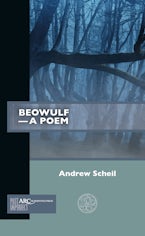Series: Past Imperfect
115 Pages, Trim size: 4.5 x 7 in
Acknowledgments
Introduction
Chapter 1: Doubt
Chapter 2: Contingency
Chapter 3: Tragedy
Chapter 4: Art and the Cunning of Form
Further Reading
Andrew Scheil is Professor of English at the University of Minnesota. He is the author of The Footsteps of Israel: Understanding Jews in Anglo-Saxon England (2004) and Babylon Under Western Eyes: A Study of Allusion and Myth (2016).
Andrew Scheil’s Beowulf: A Poem is the kind of book that fans of the poem have long needed. Beyond the other specialties and disciplines that inevitably enter and overwhelm its orbit—the Vikings, linguistics, archaeology, Tolkien—Scheil wants us to value Beowulf as poetry first and foremost. Schell reminds us that if the poem is off-putting to many of us now, it was probably seen as strange even in its own time.
~Tim Miller, Medieval World: Culture and Conflict 10 (2024): 56
| Cookie | Duration | Description |
|---|---|---|
| cookielawinfo-checkbox-analytics | 11 months | This cookie is set by GDPR Cookie Consent plugin. The cookie is used to store the user consent for the cookies in the category "Analytics". |
| cookielawinfo-checkbox-functional | 11 months | The cookie is set by GDPR cookie consent to record the user consent for the cookies in the category "Functional". |
| cookielawinfo-checkbox-necessary | 11 months | This cookie is set by GDPR Cookie Consent plugin. The cookies is used to store the user consent for the cookies in the category "Necessary". |
| cookielawinfo-checkbox-others | 11 months | This cookie is set by GDPR Cookie Consent plugin. The cookie is used to store the user consent for the cookies in the category "Other. |
| cookielawinfo-checkbox-performance | 11 months | This cookie is set by GDPR Cookie Consent plugin. The cookie is used to store the user consent for the cookies in the category "Performance". |
| viewed_cookie_policy | 11 months | The cookie is set by the GDPR Cookie Consent plugin and is used to store whether or not user has consented to the use of cookies. It does not store any personal data. |

